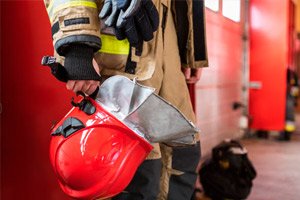
All iLive content is medically reviewed or fact checked to ensure as much factual accuracy as possible.
We have strict sourcing guidelines and only link to reputable media sites, academic research institutions and, whenever possible, medically peer reviewed studies. Note that the numbers in parentheses ([1], [2], etc.) are clickable links to these studies.
If you feel that any of our content is inaccurate, out-of-date, or otherwise questionable, please select it and press Ctrl + Enter.
Firefighters have increased risk of developing many types of cancer
Last reviewed: 03.08.2025
 ">
">Firefighters work hard to save lives, but in the process they put their own lives at increased risk for skin, kidney and other cancers, a new study from the American Cancer Society (ACS) finds.
"While this is not good news, this study draws attention to the long-term risks firefighters face beyond the immediate dangers of firefighting," said lead study author Lauren Teras, senior scientific director of the ACS Division of Epidemiological Research.
"Continuing efforts to protect the health of firefighters by expanding access to cancer screening, early detection and prevention is of paramount importance," she added in a press release.
The results were published in the International Journal of Epidemiology.
The study used data from the American Cancer Society's Cancer Prevention Study-II, which tracked cancer death rates for 36 years among people who were cancer-free when the study began in 1982.
More than 470,000 of the people in the study were firefighters, and their cancer death rates were compared with those of men in other occupations.
Overall, the study "supports the growing evidence linking firefighting occupation to cancer risk," Teras and her colleagues conclude.
The largest risks were found for skin cancer (72% increased risk) and kidney cancer (39%). There were also smaller increases in risk for lung cancer (8%), prostate cancer (14%) and colon cancer (15%), the study team said.
The researchers say the increased risk of deadly skin cancer may be due to the fact that firefighters are often outdoors without adequate skin protection. Teras noted that taking extra precautions around sun exposure could help protect them.
A small increase in the risk of lung cancer was observed only among firefighters who had worked in the profession for 30 years or more, the researchers emphasized.
Teras noted that a previous study by the International Agency for Research on Cancer (IARC) found a link between firefighting and an increased risk of mesothelioma and bladder cancer, but there was insufficient data on other tumor types.
“Our findings support a growing body of research linking occupational exposures faced by firefighters to cancer risk,” Teras said in an ACS news release. “The links to skin, kidney, prostate, and colon cancers are particularly important in filling data gaps for cancers previously considered to have limited or insufficient evidence in the IARC review.”
